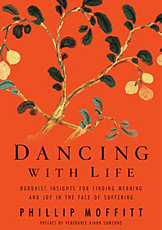Before he founded the Life Balance Institute, a nonprofit organization devoted to the study and practice of spiritual values in daily life, Phillip Moffitt served as chief executive and editor-in-chief of Esquire magazine. He is an award-winning essayist and a regular contributor to Yoga Journal. In this solid work, Moffitt takes the Four Noble Truths and uses them as a foundation for 12 insights which enable us to dance with both joy and pain while finding peace in a balanced mind. Punctuating the book are comments on poetic passages by T. S. Eliot and references to the thought of Jungian psychologist Helen Luke. Moffitt also brings to bear his experiences from more than 30 years of meditation, yoga practice, and teaching vipassana. He is convinced that mindfulness and compassion are tools for transforming suffering into joy.
Just being with our experience is an outcome of mindfulness. He quotes Ajahn Sumedho: "This moment is like this." At one point, Moffitt notes that the opposite of suffering is not happiness but a relaxed mind that is fully present with whatever is happening in the moment. We liked the story which illustrates the process of being free from attachment:
"Ajahn Sumedho tells the story of the time when a group of Thai doctors and nurses came to visit Ajahn Chah. One nurse was very beautiful. After the visitors left, Ajahn Chah asked Sumedho what he had thought of the pretty nurse. Sumedho replied in Thai, 'I like, but I do not want.' Ajahn Chah nodded approvingly and said, 'Not bad, Sumedho, not bad.' This story poignantly illustrates the Buddha's teaching of nonclinging, of being at ease with life as it is. You do not have to crave simply because you like something — your mind can rest easy in the presence of what is attractive."
In a chapter on the Eightfold Path, Moffitt suggests that we sustain our practice over the course of a lifetime, that we reference our practice so that it becomes an integral part of our daily life, and that we open to the deep realizations of our practice. To do this we need large doses of patience and perseverance as we struggle with times when it seems as if our practice is not progressing.
